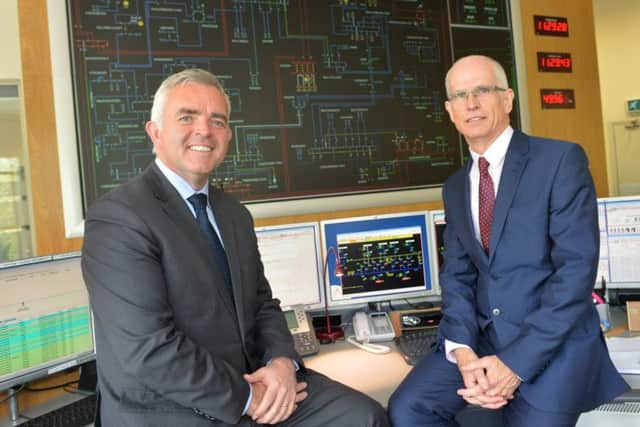Hidden crisis at Northern Ireland’s key electricity control centre – SONI – revealed


Although most people will never even have heard of the System Operator for Northern Ireland (SONI) and there is little scrutiny of its activities, it is critical to keeping the lights on and is funded by every user of electricity as part of their electric bill.
Situated high in the Castlereagh hills above Belfast, the high security and limited signage around the entrance to SONI’s headquarters alludes to both its strategic significance to Northern Ireland and to the history of electricity being used as a political weapon.
Advertisement
Hide AdAdvertisement
Hide AdA decade ago, SONI – which once was part of Northern Ireland Electricity – was sold to the Republic’s national grid company, EirGrid, which is entirely owned by the Irish state. Arlene Foster was Stormont’s energy minister at the time of the sale which was trumpeted as a positive move for electricity consumers.


But there has been growing industrial unrest within the company over recent years, culminating in a strike which was only called off earlier this month after SONI backed down at the eleventh hour, making an improved pay offer to staff and promising to enter binding arbitration about other staff concerns.
The News Letter has obtained a seven-page staff survey of members of the Prospect trade union last September which paints an alarming picture of what is going on within a company which is critical to almost every element of life in Northern Ireland, raising questions for Stormont civil servants, politicians and the Utility Regulator who each have a role in holding the company to account.
The devastating survey, which was not leaked by the union, was based on responses from 67 staff – about half of SONI’s total workforce and therefore a large sample size for such a survey.
Advertisement
Hide AdAdvertisement
Hide AdEvery one of the respondents – 100% – said that they are treated unfairly within the wider EirGrid Group and 87% do not feel that EirGrid’s ownership of SONI has been good for Northern Ireland consumers. That is a remarkable repudiation of the claims of SONI management, who in recent statements have repeatedly insisted that the company is independent of EirGrid.


The detailed survey points to staff being unsure about who really controls their company and being deeply concerned about both their own management and that of EirGrid.
When asked about the senior management’s ability to run the business, 82% gave SONI’s senior management the lowest ranked scores while 95% said they had little trust in the messages that managers give to staff.
The staff had even less confidence in the EirGrid executive team – 95% felt that the EirGrid executive team were not transparent when dealing with staff and 98% have little confidence in their contribution to a positive work culture. Words such as “arrogant”, “authoritarian”, “bullying”, “dismissive”, “superior” and “untrustworthy” were used about EirGrid management.
Advertisement
Hide AdAdvertisement
Hide AdThe survey, which chimes with comments SONI staff have made to this newspaper over recent months, shows that staff morale is extremely low. Some 90% of respondents gave the lowest ranked score for morale with no one rating morale favourably and only 3% of respondents were likely to recommend SONI as a good employer.
An overwhelming majority of respondents felt that management do not value staff, with 92% saying that feedback is not taken seriously, 98% saying that management is not transparent and 95% saying that the company does not value its staff.
When asked if it accepted that it had major problems, the company insisted that its independence had been certified – a process involving the Utility Regulator, Jenny Pyper.
The company said that “the services we provide are value for money for electricity consumers” and “our licence to operate contains conditions to ensure our independence”.
Advertisement
Hide AdAdvertisement
Hide AdHowever, the company refused to engage with the devastating survey results, despite the large number of its staff which were involved.
The company said: “SONI values its employees and we take our responsibilities towards them very seriously. SONI is aware of the Prospect survey. However as this is not an official SONI survey and is not representative of all SONI staff, we will not be commenting on it.
“In respect of recent industrial relations matters, both SONI and Prospect are working in cooperation to resolve outstanding issues. As we are in a process of industrial arbitration with the union, we will not be making any further comment.”
The TUV leader Jim Allister was a critic of the EirGrid takeover from the outset. Last year he said that Northern Ireland had been left “in perilous dependency” on the Republic.
Advertisement
Hide AdAdvertisement
Hide AdOne SONI worker told the News Letter that the EirGrid takeover had been “disastrous” for consumers, adding layers of management and confusion about who is in charge. He said that the new market – which both SONI and the regulator have said will save consumers money and which operates on an all-island basis – was “so convoluted almost no one understands it”, leading to a lack of transparency.
In recent weeks SONI has confirmed that Northern Ireland’s electricity grid can now be operated from the control room of its Irish government-owned parent company in Dublin.
Several industry sources have told the News Letter that technical changes to allow Northern Ireland’s grid to be controlled from Dublin have been put in place without publicity over recent years.
SONI confirmed that the grid was operated from both Belfast and Dublin “on an economic basis for the benefit of customers in both jurisdictions”,
Advertisement
Hide AdAdvertisement
Hide AdThe trade union which represents most non-senior SONI staff said that their concern at EirGrid’s management of the company is nothing to do with sectarianism or politics.
There is a still a perception among some people that the electricity sector is overwhelmingly Protestant and unionist, a view harking back to the days of the 1974 Ulster Workers’ Council strike when loyalist power workers in Ballylumford power station were able to topple Stormont’s first power-sharing administration with the threat of a total blackout.
Angela Moffatt, the Prospect negotiations officer who has been heavily involved in talks with the company over recent weeks, said that view was wholly outdated and that there is no way that the staff were simply objecting to EirGrid’s ownership of SONI on political grounds.
She said that SONI has a “very, very diverse workforce” and that she knew SONI staff who were Irish republicans who had concerns about what is going on. “I don’t think it is possible that these results are driven by any kind of political driver because our membership profile would not support that.
Advertisement
Hide AdAdvertisement
Hide Ad“It wouldn’t matter to our members if this was a state-owned company of Kazakhstan – the impact would be the same.”
That is borne out by the Equality Commission’s monitoring of the company which shows that its workforce is 60% from a Protestant background - slightly higher than the population as a whole – and 40% from a Catholic background.
She said that NIE Networks – which owns the physical pylons and wires which transmit electricity – had also been sold to an Irish state-owned company, ESB, several years ago but “the workforce there have none of these issues, so it isn’t true to say that it is a sectarian issue. It is purely and simply about the importance of the perception that the company is not running in Northern Ireland under its licensing conditions”.
Ms Moffatt said that Prospect had made representations to the Utility Regulator, Jenny Pyper, about the situation.
Advertisement
Hide AdAdvertisement
Hide AdHowever, she said that “the one stakeholder the regulator does not engage with on any regularised basis is trade unions and employees”.
The Utility Regulator said: “While we note the information relating to the Prospect survey, it would be inappropriate for the Utility Regulator, as the economic regulator of SONI, to comment on, or get involved in, the internal staffing matters of any regulated utility.”
Ms Moffatt said that the survey had been run from its London head office to professional standards, ensuring that staff could not participate more than once.
* This article was published in our print edition on 20 April, 2019, but was delayed in being published online due to a technical fault on our website.